By Amy Bostock
As global trade tensions rise, the impact on Canada’s restaurant industry is becoming increasingly evident. Peter Mammas, president and CEO of leading restaurant franchisor Foodtastic, weighs in on how escalating tariffs could re-shape supply chains, pricing strategies and consumer behaviour across the country.
The ongoing trade dispute has had a measurable financial impact on Canadian restaurants. According to Mammas, Foodtastic estimates an additional $10 million in costs annually across its 1,000 restaurant locations — approximately $10,000 per restaurant. With key ingredients such as fruits, vegetables, and imported wines and spirits facing higher tariffs, operators are grappling with rising procurement costs.
“The biggest impact would be on fruits and vegetables, and we would need to raise our prices roughly two per cent to compensate,” Mammas explains. This price adjustment may seem minimal, but in an industry where margins are already thin, he says even slight increases can influence consumer dining habits.
Inflationary pressures and higher restaurant prices inevitably affect consumer behaviour and Mammas notes that as costs increase, diners become more price-sensitive, seeking deals and reducing their dining occasions.
“Every time you have inflation in restaurant prices, the consumer is affected, and traffic counts reflect this,” he says, adding this shift in behaviour is particularly challenging for independent restaurant operators who lack the purchasing power to negotiate better prices or diversify sourcing strategies.
Recognizing the vulnerability of supply chains to international tariffs, Foodtastic has been proactive in its procurement strategy. Over the past few years, the company has emphasized local sourcing, with less than 10 per cent of its supplies now coming from the U.S. This strategic shift has positioned the company well to weather the current disruptions.
“With the threat of tariffs, our team worked diligently to secure direct produce shipments from Mexico and reached out to all our Canadian suppliers to assess the impact,” Mammas says.
He also highlights the importance of supporting Canadian wine producers who may face export challenges due to the dispute. “We are preparing to offer an extended Canadian wine list in all our restaurants to help these producers mitigate their tariff-driven slowdown. It’s time everyone did what they can to help put Canada first.”
While larger chains such as Foodtastic can leverage their scale to manage rising costs, independent operators are disproportionately affected by trade disputes. Smaller restaurants often lack the ability to negotiate supplier deals or diversify their sourcing strategies, making them more susceptible to price hikes.
“Independents are more adversely affected as they cannot make national deals or directly source products from other countries,” Mammas explains. This underscores the importance of industry collaboration and support to help smaller businesses navigate these economic pressures.
In response to cost increases, Foodtastic is doubling down on technology-driven efficiencies. Inventory management and forecasting tools are key components of the company’s strategy to minimize waste and optimize purchasing.
“It’s great to buy well, but waste and slippage are a major part of all our costs,” says Mammas, adding that by leveraging these efficiencies, the company aims to maintain profitability despite rising supply costs.
The path forward remains uncertain, but Mammas remains hopeful that a resolution to the trade dispute will be reached. “I do not believe tariff wars are good for anybody and hope that we find a solution and avoid them,” he says. “In the meantime, industry leaders and associations must advocate for free trade and reduced inter-provincial barriers to help restaurant operators remain competitive.”
As Canada’s restaurant sector continues to navigate these turbulent economic conditions, Mammas offers a message of resilience: “The restaurant industry has weathered COVID, hyperinflation and employee shortages, and it will weather any tariff war. The important part is to stay united and focused on our employees and business.”





















